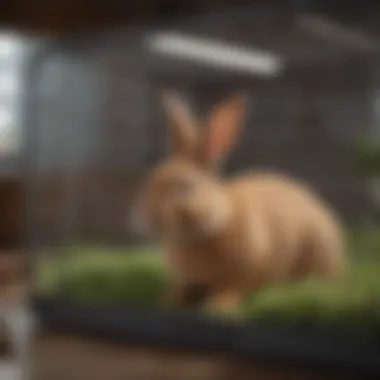Heavy Duty Rabbit Cage: Essential Guide to Rabbit Care


Intro
In the world of rabbit care, the importance of having a sturdy and reliable living environment cannot be overstressed. A heavy-duty rabbit cage serves as both a home and a safe haven for these delicate creatures. This guide aims to provide a comprehensive look into the features, types, and maintenance of heavy-duty rabbit cages, focusing on how they contribute to the welfare of rabbits.
Animal Overview
Common Name and Scientific Classification
Rabbits, often referred to by their common name, belong to the family Leporidae. The domestic rabbit's scientific classification is Oryctolagus cuniculus. This classification is important as it helps in understanding the specific needs of rabbits in terms of care and habitat.
Physical Characteristics
Domestic rabbits exhibit a wide variety of physical traits. They typically have long ears, a short fluffy tail, and strong hind legs. Fur can vary greatly in color and texture, from smooth to fluffy, depending on the breed. Body sizes also differ, with some rabbits weighing just a few pounds while others can exceed ten pounds or more.
Habitat and Distribution
In the wild, rabbits inhabit a range of environments, from grasslands to forests. However, domestic rabbits require a controlled living space for their safety and comfort. A heavy-duty rabbit cage mimics some elements of a rabbit's natural habitat, allowing for both shelter and space to move around safely.
Behavior and Social Structure
Communication Methods
Rabbits are highly social animals and communicate through various means. They use body language, thumping, and vocalizations to express needs or emotions. Understanding these cues is essential for caretakers to provide appropriate responses and meet their needs effectively.
Social Hierarchies
Within a group of rabbits, social hierarchies naturally develop. Dominance can be established through behavior such as grooming and challenging each other. Providing enough space in heavy-duty cages can reduce conflicts and allow for natural social interactions.
Mating and Reproductive Behavior
Rabbits reproduce rapidly, so it is crucial for pet owners to understand their mating behavior. A heavy-duty cage should be designed to separate breeding pairs to control reproduction and ensure the safety of all rabbits involved.
Conservation Status
Current Population Trends
In the wild, the population of rabbits can fluctuate due to environmental factors. However, the domestic rabbit population is generally stable due to human care. Heavy-duty cages support responsible pet ownership by promoting the health and longevity of pet rabbits.
Threats and Challenges
Domesticated rabbits face threats such as neglect and improper housing. Heavy-duty rabbit cages alleviate these concerns by providing security and protecting them from predators while also offering a comfortable living space.
Conservation Efforts and Success Stories
Many animal welfare organizations focus on educating the public about responsible rabbit care. This increases awareness of the proper housing conditions required for domestic rabbits. Successful initiatives show the positive impact of promoting the use of heavy-duty cages.
A suitable living environment significantly influences the overall well-being and happiness of rabbits, which is paramount for any rabbit owner who wishes to provide the best care possible.
Understanding the requirements and behaviors of rabbits ensures better care. This guide serves as a resource for achieving that goal.
Preamble to Heavy Duty Rabbit Cages
Caring for domestic rabbits requires a proper understanding of their environment. Heavy duty rabbit cages play a crucial role in providing a safe and comfortable dwelling for these pets. They are designed not only for durability but also to meet the unique needs of rabbits. This section will discuss why the introduction of heavy duty rabbit cages is vital and what aspects to consider when choosing one for your furry companion.
Understanding the Needs of Domestic Rabbits
Domestic rabbits have specific needs that must be met for their well-being. They require ample space to move, hide, and explore. Rabbit cages should provide sufficient room for eating, sleeping, and playing. The enclosure must be safe from potential threats, including predators and harmful materials. Rabbits are social creatures and benefit from interaction, so their living space should facilitate engagement with their human caregivers or other rabbits.
Additionally, the cage must be equipped to maintain a comfortable temperature and ventilation. Ventilation is necessary to prevent the build-up of unpleasant odors and moisture. A clean environment contributes to good health, reducing the risk of diseases that can arise from poor hygiene. In summary, understanding these needs is the foundation for selecting the right housing for domestic rabbits.


Why Choose a Heavy Duty Cage?
Heavy duty cages offer several advantages over standard options. One significant benefit is durability. Made from robust materials, these cages withstand wear and tear better than ordinary cages. This is particularly important if multiple rabbits occupy the same space or if the cage is exposed to outdoor elements.
Another factor to consider is safety. Heavy duty cages are designed to prevent escapes and protect rabbits from potential dangers around them. This is essential for peace of mind for rabbit owners. Furthermore, these cages often include features like heavy-duty locks, preventing any unwanted openings.
A heavy duty rabbit cage also allows for customization. Owners can select cages with adjustable sections or those fit for multi-level habitats. This flexibility accommodates various lifestyles and ensures that rabbits stay healthy and happy. Ultimately, investing in a heavy duty cage reflects a commitment to providing the best environment for rabbits.
Key Features of Heavy Duty Rabbit Cages
Selecting the right rabbit cage is critical to ensuring the comfort and safety of your pet. Heavy duty rabbit cages are designed with specific features that address the needs of rabbits. Understanding these features help improve the quality of life for rabbits and make pet ownership easier.
Material and Durability
The materials used in constructing heavy duty rabbit cages greatly impact their functionality and longevity. Common materials include steel, high-density plastic, and coated wire. Steel is often preferred due to its strength and resistance to wear. Coated wire can prevent rust while providing a solid barrier for rabbits.
A durable cage withstands typical rabbit behaviors, such as chewing and digging. This durability is essential to avoid frequent replacements, which can be costly. It is important to choose cages that meet high-quality standards to ensure that they withstand the test of time.
Size and Space Requirements
Rabbits require ample space to thrive. Heavy duty rabbit cages should be spacious enough to allow for movement and exercise. The general recommendation is a minimum of 12 square feet of floor space for each rabbit, but larger cages are always better. Vertical space is equally vital, especially for multi-level cages.
Consider the size and habits of your rabbit when choosing a cage. Larger breeds will naturally need larger cages. Providing plenty of room allows rabbits to hop, stretch, and explore, which supports their well-being. Additionally, cage size directly affects their behavior, as confinement can lead to stress.
Ventilation and Comfort
Proper ventilation in a rabbit cage is crucial for maintaining a healthy environment. Heavy duty cages should have adequate airflow to prevent issues such as respiratory problems. Good ventilation also helps in keeping the cage clean and minimizes odor build-up. Mesh panels or slotted designs can facilitate airflow effectively.
Comfort features should not be overlooked. A comfortable cage includes bedding options and protective barriers that suit your rabbit's natural instincts. The cage should have soft surfaces for resting to ensure that the rabbit feels secure. Comfort translates to a happier, healthier rabbit.
Easy Access for Cleaning
Cleaning a rabbit cage is an ongoing task for pet owners. Heavy duty rabbit cages designed with easy access in mind simplify the maintenance routine. Cages with large doors or removable trays make it easier to reach all areas of the cage. This design minimizes stress for both the owner and the rabbit during cleaning.
Regular cleaning helps prevent the buildup of waste, which is essential for the rabbit's health. Owners should look for cages that allow disassembly or easy removal of components to facilitate thorough cleaning without much hassle.
Proper maintenance not only extends the life of the cage but also ensures your pet's happiness and health.
By understanding these key features, owners can make more informed decisions regarding their rabbit's housing needs. Selecting a heavy duty rabbit cage that meets these criteria enhances the overall experience of having a rabbit as a pet.
Different Types of Heavy Duty Rabbit Cages
Understanding the various types of heavy-duty rabbit cages is critical for ensuring that rabbits receive the right environment tailored to their specific needs. Each type of cage serves distinct purposes and offers benefits that can greatly impact the health and well-being of domestic rabbits. This section provides an overview of the primary types of cages available, helping potential rabbit owners to make informed choices that align with their living conditions and the rabbit’s lifestyle.
Indoor Rabbit Cages
Indoor rabbit cages are designed for housing rabbits within the home. These cages typically feature a compact design with easy access for both the rabbit and the owner. The benefits of indoor rabbit cages are numerous. They allow owners to keep rabbits in close proximity, fostering social interaction and easier monitoring of health behaviors.
When choosing an indoor cage, consider the following elements:
- Size: Rabbits need ample space to move around. Choose a cage that accommodates their size comfortably.
- Material: A heavy-duty frame constructed from metal or durable plastic is preferred. This ensures longevity and safety from chewing behaviors.
- Accessibility: Easy entry and exit points make daily care much simpler for owners.
Outdoor Rabbit Cages
Outdoor rabbit cages are specifically designed for rabbits that will spend significant time outside. They are constructed to withstand environmental factors such as rain, sun, and wind. An outdoor cage can enhance a rabbit’s quality of life by providing natural stimuli and opportunities for exercise.
Key features to consider:
- Weather Resistance: Materials should be weatherproof which ensures that the cage lasts longer under changing conditions.
- Security: Since predators can be a concern, sturdy locks and reinforced materials help safeguard rabbits against threats.
- Space for Movement: Ensure the cage allows for running and hopping, as outdoor time is essential for health.
Multi-Level Cages


Multi-level cages provide vertical space for rabbits, making them ideal for smaller living environments. These cages often include ramps and platforms that allow rabbits to explore different levels, simulating a more natural habitat.
Reasons to select multi-level cages:
- Space Efficiency: They maximize vertical space, making them suitable for apartments or smaller homes.
- Enrichment: Multi-level designs encourage exercise and reduce boredom, which is beneficial for a rabbit's mental health.
- Increased Interaction: These cages can allow multiple rabbits to cohabitate with enough space, enhancing social needs of rabbits.
Custom Built Cages
Custom built cages allow for a unique approach to rabbit housing. Owners can design these cages based on specific requirements of their rabbits and available spaces. This option caters to individual preferences regarding size, design, and functionality.
Considerations for custom cages include:
- Specific Dimensions: Tailor the size to meet the actual space needs of your rabbits, based on breed and behavior.
- Personal Features: Add features like built-in tunnels, hideouts, or materials that match personal aesthetics or home decor.
- Flexibility: Custom cages can easily adapt if the owner gains more rabbits or changes living arrangements.
"Selecting the right type of cage is crucial to ensure that your rabbit leads a healthy and enriching life."
Selecting the Right Heavy Duty Rabbit Cage
Selecting the right heavy duty rabbit cage is paramount in ensuring the wellbeing of domestic rabbits. A quality cage not only shields them from potential harm but also provides a comfortable environment for rest and play. Many factors come into play when choosing a cage, from size to budget, and it is crucial to evaluate these elements thoroughly.
Assessing Your Rabbit's Size and Habits
Before making a purchase, understanding your rabbit's size and habits is essential. Different breeds vary significantly in size. For instance, a Flemish Giant will require much more space than a Netherland Dwarf. A heavy duty rabbit cage needs to allow enough room for your rabbit to stand on its hind legs, stretch, and hop around freely. Additionally, consider the habits of your rabbit. Is it more energetic or docile? A more active rabbit might benefit from a larger space or even a multi-level cage to explore.
Evaluating Available Space
The location for placing the cage should also be considered. Measure the area allocated for the cage, ensuring it can accommodate the chosen size comfortably. Space constraints can lead to a cramped living condition for your rabbit, affecting its physical and mental health. If indoor space is limited, outdoor cages may serve as an alternative, provided they are safe from predators and weather conditions. Proper ventilation and protection are essential when selecting a cage that will be situated outdoors.
Budget Considerations
Budget plays a significant role in the selection process. Heavy duty rabbit cages can come at various price points, depending on materials and features. It is prudent to remember that investing in a quality cage is a long-term commitment. A durable and well-constructed cage may seem expensive initially but can offer savings in the long run by reducing the need for replacements. Consider setting a clear budget but remain flexible for designs that offer superior safety and comfort for your rabbit.
A well-chosen cage ensures the welfare of your rabbit and contributes to a better pet-owner experience.
Maintenance and Care for Heavy Duty Rabbit Cages
Caring for a heavy duty rabbit cage is vital for the health and well-being of your rabbits. Regular maintenance ensures that their environment remains safe and hygienic. This section highlights some specific elements and considerations involved in the upkeep of these cages.
Regular Cleaning Routines
Consistent cleaning routines are necessary for preventing health issues in rabbits. Rabbits are sensitive creatures, and a dirty cage can lead to infections or discomfort. To maintain a healthy environment:
- Remove droppings daily: Rabbits produce a significant amount of waste. Collect and dispose of droppings regularly to prevent bacterial growth.
- Wash bedding weekly: Bedding should be washed or replaced weekly. Use a pet-safe detergent to avoid harmful residues.
- Deep clean monthly: Every month, perform a thorough cleaning. Remove everything from the cage and scrub all surfaces using warm, soapy water. Rinse well and allow it to dry completely before replacing any items.
Inspecting for Damage and Wear
Routine inspections for damage and wear are essential to ensure the safety of your rabbits. Heavy duty cages are built to last, but they are not indestructible. Consider the following:
- Check for loose or sharp edges: Inspect the cage for any parts that may have loosened or come apart. Sharp edges can harm your rabbits.
- Look for rust or corrosion: Depending on the material, some cages may develop rust over time, especially if exposed to moisture. If you see any signs of rust, address it immediately.
- Examine the door and latch: Ensure that the door functions properly and the latch secures it well. A malfunctioning door can pose a risk of escape or injury.
Replacing Worn Parts
As part of ongoing maintenance, replacing worn parts is critical for maintaining the cage’s integrity. Over time, components may fail, needing your attention:
- Identify parts needing replacement: Keep an eye out for any cracks, breaks, or significant wear on components like doors, latches, and even the base.
- Source quality replacements: Use parts from a trusted manufacturer that match the specifications of your cage. Improper sizing may affect the overall safety.
- Incorporate upgrades if necessary: If you find that certain parts do not function well, consider upgrading to more durable alternatives. This investment can enhance the longevity of your cage.
Regular maintenance is not just about appearance; it is a crucial element in promoting a safe and healthy habitat for your rabbits.
Benefits of Heavy Duty Rabbit Cages


Heavy duty rabbit cages bring significant advantages that deeply impact the life of domestic rabbits. Understanding these benefits can assist pet owners in making informed decisions. When considering the welfare of rabbits, a well-constructed cage ensures safety, longevity, and overall well-being.
Enhanced Safety for Rabbits
Safety should be the primary concern of every rabbit owner. Heavy duty rabbit cages provide a secure space that protects rabbits from natural predators as well as potential hazards that might exist in households. Made from robust materials, these cages minimize the risks of escape or accidents that can lead to injury. Many come with features such as secure locks and sturdy construction that further ensure that rabbits cannot easily be harmed or escape.
A well-built cage also helps in preventing injury from chewing on inappropriate materials or getting caught in potentially dangerous areas. A safe environment can lead to a more relaxed rabbit, which is crucial for mental health.
Long-Term Investment Value
Investing in a heavy duty rabbit cage can seem costly at first. Yet, considering the long-term benefits renders it a wise decision. These cages, built from durable materials, withstand wear and tear better than standard options. Owners often find that they need to replace lesser quality cages regularly, leading to higher costs over time.
Additionally, heavy duty cages require less frequent repair due to their robust nature. This reliability adds to their overall value. When you invest in quality, you reduce the need to contemplate replacements for years, which ultimately translates into financial savings.
Support for Rabbit Well-Being
Rabbits, like all living creatures, require environments that foster their well-being. Heavy duty cages can play a crucial role in this aspect. The spaciousness and security allow rabbits to exhibit natural behaviors, such as jumping and digging, which are essential for their mental stimulation. This kind of environment not only promotes physical health but also supports emotional stability.
Furthermore, the design of many heavy duty cages supports proper ventilation and temperature regulation, ensuring a comfortable living space for rabbits. This attention to their needs can lead to happier, healthier pets.
Investing in a heavy duty rabbit cage is not just about providing a home; it’s about ensuring the overall safety and well-being of your rabbit.
Common Misconceptions about Rabbit Cages
Understanding common misconceptions about rabbit cages is essential for proper rabbit care. Many of these beliefs stem from a lack of information or exposure to wrong practices. Misinformation can lead to poor living conditions for rabbits, ultimately affecting their well-being. Addressing these myths takes us a step closer to ensuring we provide an optimal environment for our furry companions.
Size Doesn't Matter
A pervasive myth is that the size of the cage does not significantly impact a rabbit's well-being. This notion could not be further from the truth. Rabbits, like most animals, require adequate space to thrive. A small cage limits their ability to hop, stretch, and perform natural behaviors.
Key Considerations:
- Exercise Space: Rabbits are naturally active creatures. A larger space allows them to exercise, reducing the risk of obesity and associated health problems.
- Mental Health: A cramped environment can lead to stress and boredom. This can manifest as destructive behaviors, such as chewing on inappropriate items or becoming overly aggressive.
- Living Area: A guideline suggests that the cage should be at least four times the size of the rabbit when it stretches out. Providing enough space helps ensure a happier and healthier rabbit.
All Rabbits Can Share a Cage
Another common misconception is that all rabbits can share a cage without any issues. While some rabbits can coexist harmoniously, this is not universally true. Each rabbit has its own temperament and social needs, which influence whether they can share space.
Important Points:
- Territorial Behavior: Rabbits can be territorial. A cage that is too small for multiple rabbits can lead to fights and stress.
- Pairing Compatibility: Not all rabbits, even if they are of the same breed, will get along. Proper introductions and space consideration are critical before housing them together.
- Individual Space Requirement: Each rabbit should have its own space. Even social rabbits need a refuge where they can retreat when they feel overwhelmed.
In summary, while social interactions among rabbits can be enriching, housing them together is risky if their needs and personalities are not matched appropriately. A careful approach is necessary to avoid conflicts and ensure a safe environment for all rabbits involved.
Understanding these misconceptions helps in better rabbit care. It empowers owners to create a nurturing living environment, ensuring happy and healthy rabbits.
The End: Making an Informed Choice
Choosing the right heavy duty rabbit cage is not a simple decision. It requires careful consideration of your rabbit's needs, your living situation, and your budget. This conclusion section pulls together the essential points discussed in the article to offer a clear perspective on how to make an informed choice.
Investing in a heavy duty cage means prioritizing the well-being and safety of your rabbit. A well-constructed cage can avoid common issues associated with substandard products. Additionally, the durability of materials used impacts long-term costs. Cheaper options may seem appealing at first, but they often do not stand the test of time, leading to additional replacement costs.
Another important aspect is the size of the cage. Rabbits need ample space to move, play, and rest. A cramped environment can affect their health and happiness. This is a consideration that should not be overlooked when making your decision.
When you assess your specific needs and the unique circumstances surrounding your rabbit care, you are better equipped for this important choice. Don't rush the process. Take your time to research options and consider different factors at play.
Recap of Key Points
- Material and Durability: Choose cages made from quality materials that withstand wear and tear. Metal offers a longer lifespan compared to plastic.
- Size Matters: Ensure the cage is spacious enough for your rabbit to move comfortably. Research specific breed sizes to make an informed choice.
- Maintenance Ease: Opt for cages designed for easy cleaning to ensure hygiene. It makes your routine simpler and promotes better health for your pet.
- Personalization: Consider a custom-built cage if your rabbit has particular needs or if you have space constraints. This can enhance your rabbit's quality of life.
Final Thoughts on Rabbit Care
Ultimately, caring for a rabbit involves more than just providing food and water. The environment in which your rabbit lives plays a significant role in its overall well-being. A heavy duty rabbit cage represents a commitment to providing a safe, comfortable, and stimulating environment for your pet.
As you reflect on your options, remember that each rabbit is an individual with distinct needs. Investing in a quality cage is a step towards a fulfilling life for your rabbit. The right cage contributes to better health and happiness, developing a stronger bond between you and your pet. By understanding and applying the knowledge acquired in this comprehensive guide, you are well on your way to ensuring that your rabbit thrives.
"A well-built cage reflects the owner's commitment to responsible pet care."







